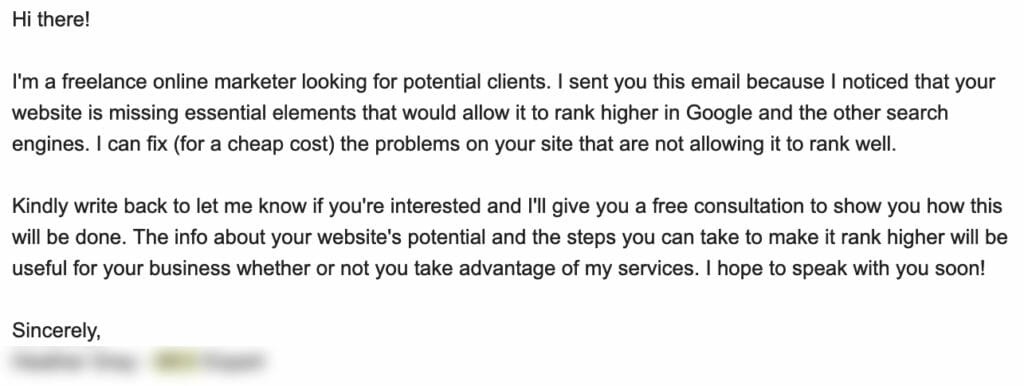 As a business owner, it is inevitable that your receive hundreds of emails a day. Most are probably from your current and prospective clients, but you likely also see a few offering an “SEO Proposal” or from a person who is an “Expert SEO Strategist” who has reviewed your website and wants to help. This “expert” magically holds all the secrets of Search Engine Optimization, can enhance your company’s online presence and will fix your website. Initially, this sounds amazing, right? Unfortunately, more often than not, this a complete scam. These “experts” that contact you with no initiation on your part are nothing but scam artists.
As a business owner, it is inevitable that your receive hundreds of emails a day. Most are probably from your current and prospective clients, but you likely also see a few offering an “SEO Proposal” or from a person who is an “Expert SEO Strategist” who has reviewed your website and wants to help. This “expert” magically holds all the secrets of Search Engine Optimization, can enhance your company’s online presence and will fix your website. Initially, this sounds amazing, right? Unfortunately, more often than not, this a complete scam. These “experts” that contact you with no initiation on your part are nothing but scam artists.

It is very important to note that there are numerous real SEO agencies out there that really can help your company. These companies have legitimate websites, phone numbers, emails and business locations. Their email is expertly and professionally written, detailing out examples and referencing you back to their own valid website. If you can trace back the company and see that the company is authentic, then you are dealing with a legitimate company.
A Plea To Those In Charge
Sourcing out something as important as your online presence and reputation can be scary. Whether you use an in-house SEO employee or an SEO agency, you need trust your vendor, or fire them. If you don’t trust your SEO provider, then you have a big problem that needs to be addressed right away.
In my years in the business, I have encountered three types of clients. Only two of them are good.
- The ideal clients understand what we do and support our efforts. These clients are great to work with and see great success.
- The second best type of client does not understand what we do, but they know that they don’t understand it. These clients trust that we know what we are doing and allow us to do our job without interruption.
- The worst type of clients, and the ones that typically don’t succeed, are the ones that think they understand what we do, but in reality, they do not. These clients question every move you make. They require hours of explanations around the simplest “why” and they generally get in the way of their own progress.
These types of clients tend to fall victim to a random email telling them their SEO is lacking. Again, I urge you to either trust your SEO provider or fire them.
Measuring SEO Success
One reason many business owners do not understand the value of SEO is that ROI (Return on Investment) is so hard to track. We want you to understand how to measure the value of your SEO campaign so you can rest assured that our efforts are creating a stronger online presence for your company.
Measuring SEO is most often easier said than done. You cannot simply measure SEO success by checking boxes on a checklist. There are a staggering number of variables in any SEO campaign and several metrics are needed to gauge success. The complexity can be challenging and it takes faith to master the art and science of measuring SEO.
There are three key performance indicators (KPIs) that should always be considered when measuring an SEO campaign’s effectiveness:
- Rankings
- Traffic
- Conversions
Rankings
Keyword rankings are the most common and obvious KPI. It stands to reason that websites listed on the first page of Google receive up to 92 percent of traffic share. It is important to track keyword rankings over time so you can tailor your SEO strategy around the keywords that attract the most attention and provide the most benefit.
While tracking keywords, you may discover that some of your favorite keywords are simply too competitive and do not provide enough benefit to warrant the effort. It would be more beneficial to focus on other keywords that have the chance of getting into the top three positions where they are more likely to really pay off. Without keyword ranking data, making informed strategic decisions such as this would be very difficult.
Traffic
First page rankings are useless if they do not deliver enough of the right kind of traffic. For this reason, measuring the volume and quality of traffic that first page rankings deliver is essential.
Traffic volume should be measured based on the number of visits that come from organic search. With a successful SEO strategy, you should see a significant increase in organic search traffic over time. How much traffic you should expect depends on the size of your target audience. For example, a company that sells products online can expect more traffic than a local beauty salon.
Measuring the quality of traffic is a bit trickier as it requires more careful analysis. When reviewing these metrics, if you find that the average number of pages viewed per visit is low, the average time visitors spend on the site is also low, and the site’s bounce rate is high, you may have discovered there is either an issue with your website or with the type of traffic your keywords are delivering.
Conversions
Perhaps the ultimate measure of success for an SEO campaign is conversions. Conversions should be defined based on your specific goals, whether it be increased leads or actual purchases.
If your goal is to increase leads, tracking your conversion rate may include such things as contact requests, quote requests, appointment requests or phone calls.
If your goal is to increase sales, it is important to note that not all visitors are ready to buy immediately and you should be sure to measure the actions of those visitors as well. These conversions can be defined as newsletter subscriptions, social media shares and any other action the visitor takes that indicate they are interested in what you offer. These types of conversions also serve as a great traffic quality indicator.
When tracking conversions and determining ROI, it is important to distinguish between conversions that result from organic search and conversions from paid advertising. Having a system in place to track the monetary value of conversions gives you the ability to determine the ROI of your SEO campaign.
Tracking KPIs not only allows you to measure your SEO campaign’s current performance, but also provides actionable data to help you make the right decisions to ensure its future success.
Search Engine Optimization is a very technical and time-consuming practice for businesses. You need someone with the know-how to get your site to rank at the top of search engine results pages for your target keywords. By getting your site to appear on the first page consistently, you can expect to receive hundreds, or even thousands, of visitors representing potential customers or subscribers.
The SEO field is so crowded that it can be confusing and difficult to choose a company to trust with your business. SEO is meant to help search engines rank your business higher for relevant searches and help your customers find you. SEO should not be specific to just local or just organic, if you want your business to be found online you need to optimize for both.





About The Author: Mysti French
Mysti French is a rockstar content writer! Before joining Raincross, she wrote and developed site content for such sites as Organize.com, MonkeySports, Marketing Instincts and Brenner-Feidler.
Mysti grew up in San Diego before moving to Perris, CA. She graduated from Cal State Hayward (later changed to Cal State East Bay) with a BA in English and Political Science.
More posts by Mysti French